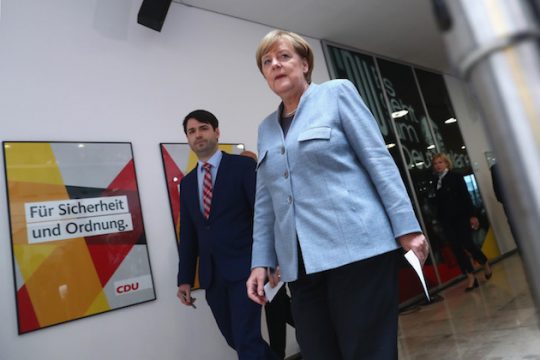Following yesterday’s federal elections in Germany, one thing is clear: Angela Merkel will have a fourth term as chancellor. Unfortunately that is the only thing that is clear.
Although Merkel’s Christian Democrats garnered the most support, the CDU plummeted from 41.5 percent in 2013 to 33 percent. The Social Democrats dropped from 25.7 percent four years ago to 20.5 percent. At the moment, the SPD is the junior partner in the current Grand Coalition government. But as of yesterday, its leaders said they are choosing to lead the opposition to the next government. This means the CDU needs to find a new partner or partners to run the country.
This would normally be the moment when Merkel turns to the pro-business Free Democrats, traditional king-makers in postwar German politics. In 2013 the FDP suffered a setback when it polled just below the 5 percent threshold—meaning it no longer qualified for representation in the Bundestag. After four years in the wilderness, the FDP has come back, going from 4.8 percent to 10.7 percent. But because of the CDU’s own drop in support, combining the two parties will not get the coalition to the needed majority of 355 seats (it gets them 326).
As Senator-elect Bill McKay says at the end of The Candidate, "What do we do now?"
Unless the SPD changes its mind about not returning to a Grand Coalition, the only real possibility left is a three-party arrangement: Christian Democrats, Free Democrats, and the Green Party. Based on the party colors of black, yellow, and green, this is commonly referred to as the Jamaica Coalition.
There have been murmurs of Jamaica during the last few election cycles. It’s unprecedented on a federal level, but on the regional level, it’s been done (in the northern state of Schleswig-Holstein, for example). And for a time, the city of Hamburg was run by a CDU-Green government. All sides are forced to make painful compromises—in the 1990s, the Greens were excoriated by their base for supporting military intervention in the Balkans. It won’t be pretty, but it’s possible.
The current mess could have been avoided had the CDU (and moreso its Bavarian sister party CSU) not lost its footing at the polls. But it did, which brings us to the party that came in third place: the Alternative for Germany (AfD). From 4.7 percent support in the polls in 2013, the populist party surged to 12.6 percent. This translates to about 94 seats in the Bundestag, more than the FDP, the far-left Die Linke, or the Greens.
Already the media, especially in Germany, are struggling to come to grips with the new reality. But one thing is certain: The massive influx of immigrants into the country under Merkel’s watch did not sit well with many Germans. (In this AfD ad, the question is "New Germans?" The answer: "We’ll make them ourselves.")
So cultural fears and security fears have combined to give AfD a voice in the Bundestag. But who’s voice, specifically? In the middle of its victory lap press conference, chairwoman Frauke Petry walked out, announcing she will no longer be affiliated with the AfD and will represent her district as an independent. (The presser was like Tony D’Amato’s walk out in Any Given Sunday.)
Petry’s exit followed much internal squabbling over leadership. But whenever Petry decides to have that sit-down interview, I’m guessing her explanation will be the old chestnut: I didn’t leave the AfD. The AfD left me.
